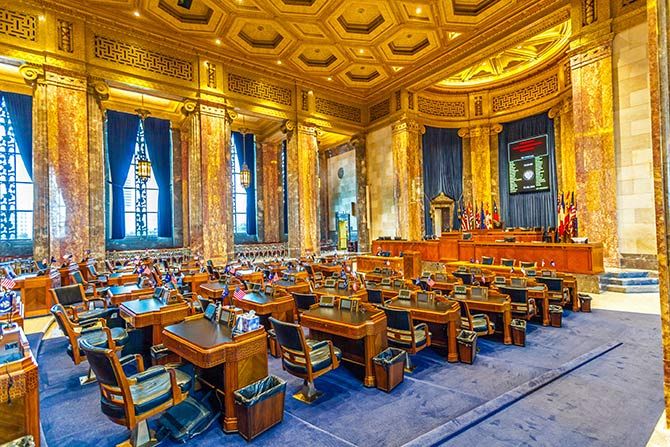Thanks to your continued advocacy and engagement, we’re making steady, measurable progress.
The session has officially come to a close, and LADA was present and engaged at the Capitol every step of the way.
This year’s fiscal session saw 944 bills, 24 constitutional amendments and more than 750 resolutions and study requests introduced. Our team actively tracked and engaged on more than 50 measures with potential implications for the retail auto industry. Whether the issue was tax policy, insurance reform, regulatory modernization or franchise protections, our focus was clear: Protect your business, cut through red tape and ensure Louisiana dealers remain strong and competitive.
Thanks to your continued support and involvement, we made meaningful progress on legislation that safeguards our industry, strengthens the franchise system and promotes a fair, competitive business environment for Louisiana dealers.
Although this was officially a fiscal session, insurance and legal reform quickly emerged as a defining theme — and for good reason. Louisiana continues to rank among the most expensive states in the nation for auto injury claims. This reality has become a competitive disadvantage for employers and insurers operating in the state, prompting lawmakers to pursue bold reforms modeled after successful initiatives in states like Florida.
Several key bills were signed into law this session to help restore balance to Louisiana’s legal system and curb abusive claims practices. But meaningful progress didn’t stop there. Lawmakers also advanced critical measures on tax policy, inventory relief, industry modernization and workforce development. What follows is a comprehensive summary of the most impactful legislation — both enacted and defeated — across each of these priority areas.
Legal and Insurance Reforms
HB 450
HB 450 by Representative Michael Melerine eliminates the “Housley presumption” — a decades-old legal precedent that unfairly favored plaintiffs in auto injury litigation. Previously, if a plaintiff claimed to be in good health before an accident, showed symptoms shortly afterward and had a doctor willing to link the injury to the crash, courts would presume the accident caused the injury. The burden then shifted to the defendant to disprove the claim. This change rebalances the playing field in auto-related lawsuits.
HB 434
HB 434 by Representative Jason DeWitt significantly strengthens Louisiana’s “No Pay, No Play” law, raising the bar for uninsured drivers from $15,000 to $100,000. Those claimants without insurance are now barred from recovering the first $100,000 in both bodily injury or property damage claims — drastically reducing the incentive to sue. For example, if a jury awards a plaintiff $105,000, the insurer would only be required to pay the plaintiff $5,000.
HB 431
HB 431 by Representative Emily Chenevert reforms the state’s comparative fault rule, barring recovery for plaintiffs found 51% or more at fault in an accident. A late-session amendment in Senate Judiciary A, however, requires juries to be informed of how their fault allocation affects the financial outcome of the case — an unwelcome change that could inject bias into jury deliberations.
SB 231
SB 231 by Senator Mike Reese brings long-overdue transparency to medical damages by allowing judges and juries to see both the billed and paid amounts for medical treatment to plaintiffs, capping recovery to what was actually paid when private insurance or Medicare is used.
HB 549
HB 549 by Representative Rodney Schamerhorn requires insurers to offer premium discounts to commercial vehicle policyholders who install dashboard cameras and telematics systems, incentivizing proactive safety practices.
HB 148
HB 148 by Representative Jeff Wiley enhances insurance rate transparency, mandating disclosure of prior premium amounts on renewal notices. However, the legislation also gives the Insurance Commissioner new authority to block or even retroactively reduce rates deemed excessive or unfair, regardless of market competition. The Insurance Commissioner and insurance companies were against this specific provision, reasoning that it gives the Commissioner too much arbitrary power and could be ripe for future abuse.
HB 438
HB 438 by Representative Gabe Firment clarifies insurance law by ensuring that institutional advertising expenses — such as brand-building campaigns not tied to specific products or aimed at informing consumers — cannot be used to justify rate increases. Under the updated definition, only operational expenses directly related to acquiring and servicing policies may be factored into rate-setting.
SB 137
SB 137 by Senator Kirk Talbot requires insurers writing auto or property insurance in Louisiana to notify the Department of Insurance within 10 days when they decide to cease, pause or resume writing new policies in any geographic region of the state. Insurers must include the effective date, affected lines of insurance, impacted area and a brief explanation for the action.
HB 345
HB 345 by Representative John Wyble increases the notice period for cancellation and nonrenewal to 60 days for most property and casualty insurance policies. It includes the cause for the nonrenewal — giving insureds more time to respond, resolve issues or shop for new coverage.
Tax Reform and Fiscal Policy
In addition to legal reform, the session also saw significant movement on tax policy — especially around Louisiana’s burdensome and uncompetitive inventory tax. While long-term repeal remains a work in progress, the following measures represent important steps forward:
HB 365 and HB 366
HB 365 and HB 366 by Representative Daryl Deshotel, together, lay the groundwork for eventual inventory tax relief. HB 366 proposes a constitutional amendment on the April 2026 ballot to allow parishes to exempt business inventory from property taxes, addressing one of the primary complaints about the defeated March 2024 amendment — that it was too complex. HB 365 provides the enabling legislation for parishes that choose to opt in, including a choice between a one-time lump sum payment from the state or a phased payout. For example, Lafayette Parish would receive $15 million in exchange for opting out of collecting inventory taxes.
HB 383
HB 383 by Representative Ken Brass sought to extend the inventory tax credit for C corporations during the transitional period to see if voters approve of the previously mentioned constitutional amendment, and when parishes decide whether to opt out of collecting. The bill originally proposed a 10-year extension, which was reduced to five, then two, before ultimately failing in the Senate. While that outcome was disappointing, the intent remains clear: to provide certainty and continuity for C corporations as the new system takes shape.
Pass-Through Entity Protection
Importantly, LADA already secured pass-through entity protection for S corporations, LLCs and partnerships during the November 2024 special tax session, ensuring those businesses continue receiving the inventory tax credit — despite some misleading news reporting to the contrary. The decision not to extend the inventory tax credit to C corporations was based on the fact that these businesses benefited from the repeal of the corporate franchise tax during the November 2024 special session, whether we agree or not.
SB 65
SB 65 by Senator Franklin Foil changes the inventory tax credit. For C corporations, the credit is limited to ad valorem taxes paid on inventory prior to July 1, 2026, though the carry-forward period is extended from five to ten years. For entities taxed as S corporations for federal income tax purposes, effective July 1, 2026, the credit may only be earned on amounts that flow through to shareholders and must be allocated in proportion to ownership interests, pursuant to R.S. 47:287.732(B). These limitations do not apply to entities taxed as partnerships or disregarded entities for federal purposes (e.g., LLCs not electing S corporation status), which may continue to allocate the credit to owners as provided under existing law.
SB 44
SB 44 by Senator Jay Luneau, which would have replaced the refundable Inventory Tax Credit with a nonrefundable 10-year carryforward-only system, was soundly defeated. This was a major win for dealer liquidity and ensures dealers can continue to reinvest in operations, facilities and workforce.
HB 578
HB 578 by Representative Julie Emerson reinstates the sales tax exemption for rental vehicles provided under warranty agreements, retroactive to Jan. 1, 2025. This avoids double taxation on a single transaction and allows eligible dealers to seek refunds.
SB 112
SB 112 by Senator Katrina Jackson-Andrews restores local vendors’ compensation to dealers processing registrations through the state system. This ensures proper reimbursement for the administrative burden of collecting and remitting local taxes, pursuant to local ordinances.
Motor Vehicle Industry Legislation
Several other key measures were enacted that modernize how Louisiana regulates and supports its auto dealers:
HB 476
HB 476 by Representative Bryan Fontenot, one of LADA’s top priorities, updates Louisiana’s safe harbor doc fee cap of $425 by indexing it to the Consumer Price Index (CPI-U), with a 3% annual cap. The Division of Administration performs the calculation, verified by the Legislative Auditor and published by the LMVC by Feb. 1 of each year. This structure eliminates the need for constant legislative updates while also helping dealers manage rising compliance costs. The safe harbor doc fee caps remain fully negotiable and must be disclosed on the bill of sale. As always, dealers are encouraged to base their doc fee on their own independent economic circumstances.
SB 37
SB 37 by Senator Bob Hensgens enacts a major structural reform of the Louisiana Motor Vehicle Commission, creating an independent three-member legal panel to hear all licensee disputes. This strengthens due process and addresses longstanding concerns about bias and adjudicative fairness.
House Concurrent Resolution 69
House Concurrent Resolution 69 by Representative Kim Carver creates a task force to study the potential consolidation of the Louisiana Motor Vehicle Commission and the Used Motor Vehicle Commission. The group will also examine broader issues such as modernization, licensing procedures, fee structures, and advertising rules and regulations. LADA will have a direct voice in this important conversation, with the president and CEO serving as the association’s appointed representative on the task force.
HB 580
HB 580 by Representative John Illg seeks to modernize Louisiana’s temporary tag system by:
- Requiring temporary tags to be placed on the rear bumper (not the window).
- Matching temporary tag numbers with the permanent plate.
- Increasing the temporary tag fee from $4 to $20.
- Establishing a print-on-demand system, already in use in most other states.
The bill also gives rulemaking authority to OMV Commissioner Bryan Adams, who has indicated that implementation will follow the selection of a qualified paper vendor and technology vendor to ensure weather-resistant tags, fraud prevention measures and a more efficient registration process. Dealers are encouraged to begin placing temporary tags on the rear bumper — where the permanent plate will ultimately go — a best practice that many are already following, which helps law enforcement.
This session delivered meaningful victories on multiple fronts: We advanced long-overdue legal and insurance reform, laid a path toward inventory tax relief, and modernized industry regulations that directly affect your business. These accomplishments reflect a strategy of both offense and defense, securing the tools needed to compete while protecting the foundational policies that support Louisiana’s dealer network.
Long-term goals like full inventory tax repeal and broader market stability remain on the horizon. Thanks to your continued advocacy and engagement, we’re making steady, measurable progress.








